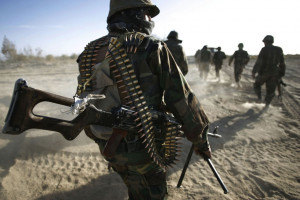
The successful completion of elections in Afghanistan in September 2014, creation of a national unity government and the first peaceful transition of power from one elected president to another give some hope for possible political, military and economic stabilization in the country.
The withdrawal of US/NATO international coalition forces from Afghanistan pushed regional actors (first of all, Afghanistan, China and Pakistan) to work out a new formula for existence. It comprises three components. These are the strengthening of economic ties, creation of a secure environment, and interchange of human resources. China, as one of the leaders of Asia, is forming a strategy and improving relationships with its closest partners to guarantee future growth of its economic potential in the region.
Afghanistan, in turn, realizes that the lasting stability of its economy can only be ensured by “enhanced regional integration”. Thus, the visit to China defined the direction of the new Afghan authority’s foreign policy – strengthening Kabul’s position in Asia.
At this stage, Afghanistan, China and Pakistan characterize their relationship as “special”, as a “triangle of stability”. They state that their aim is to establish a comprehensive and lasting partnership. As far as Afghanistan is concerned, Pakistani and Chinese interests are quite similar. These are the further strengthening of economic integration, fighting against terrorism in the region, confinement of separatist unrest, access to Central Asian markets, etc.
The prerequisites for the implementation of the above-mentioned agenda are peace and stability in the region and a higher standard of living of the people. As strategic partners, China and Pakistan are interested in establishing stability in the region.
Before the visit of President Ashraf Ghani, Beijing stated that the issue of internal security remains unresolved for Kabul. At the same time, China does not seek to replace the Western troops withdrawn from Afghanistan. Beijing’s key priority is to provide financial and technical assistance for rebuilding the country’s infrastructure. Its large-scale investments in the Aynak copper mine project, the construction of the Jomhuri Hospital, ZTE, Huawei and Sinohydro, etc., are well-known. This is a medium-term plan.
There also are long-term plans. The three countries are focused on Central Asia that is rich in water, energy resources and undeveloped commodity markets. Very beneficial deals can be arranged within the political, economic and logistical spheres of the three countries. For example, the Amu Darya Basin oil project, with technical and financial assistance from Beijing, can help Afghanistan’s economy to recover.
Pakistan, for its part, once again announced in October 2014 the resumption of its joint power project with Afghanistan, CASA-1000.
Islamic extremism remains one of the regional challenges for the “triangle” of countries. China and Pakistan fear that the withdrawal from Afghanistan of such a restrictive force as the US / NATO international troops will dramatically boost terrorist activity in Afghanistan. In fact, in recent months, the Taliban launched a series of audacious attacks on the national army and the civil administration’s facilities in the southern and central provinces.
Beijing, in particular, fears that the “Islamic wave” will come to Xinjiang. China has a common border with Afghanistan – the Wakhan Pass. Beijing has blocked it for a long time, fearing the flow of separatists. Local ethnic Uighur separatists have repeatedly held anti-government rallies, demanding secession from the People’s Republic of China and the creation of an independent East Turkistan state in the Xinjiang region. Beijing has more than once urged Afghanistan and Central Asian countries to intensify the fight against religious extremism. According to the Chinese authorities, religious fanatics provoked a wave of attacks in Xinjiang and across China where hundreds of people have been killed over the last two years.
In September 2001, after the fall of the Taliban regime in Afghanistan, China provided 250 million dollars in aid to Afghanistan. However, financial support was rather restricted and mostly limited to the training of counter-narcotics experts. Thirteen years later, Beijing is providing 327 million dollars in aid to Kabul through 2017, and also intends to assist in the training of 3,000 Afghan professionals over the next five years.
In other words, the strategic partners of the “triangle” are once again talking about the so-called Pamir group, whose joint territory, as they view it, is a crossroads of goods, ideas, cultures and religions between China, the Arab world, and Europe. There are plans to revive the Silk Road. The starting geographic point in China is the small town of Kashgar in the Xinjiang Uyghur Autonomous Region. It is located just a few hours away from the Wakhan pass. Beijing regards this town as a possible ground for a Central and South Asia Industrial Park and storage facilities. To this end, today Beijing is investing in the construction of a road network, energy pipelines, electric mains and other infrastructure connecting Afghanistan with Pakistan and China.
During his visit, President Ashraf Ghani expressed support from the Afghan side for China’s fight against East Turkistan Islamic Movement terrorists. However, at the same time, he once again raised the issue of opening the Wakhan pass rigidly blockaded by China. Beijing promised to think about it.
Natalia Zamarayeva, PhD in History, Senior Research Fellow, Department of Pakistan at the Institute of Oriental Studies in the Russian Academy of Sciences, exclusively for the online magazine “New Eastern Outlook”.
